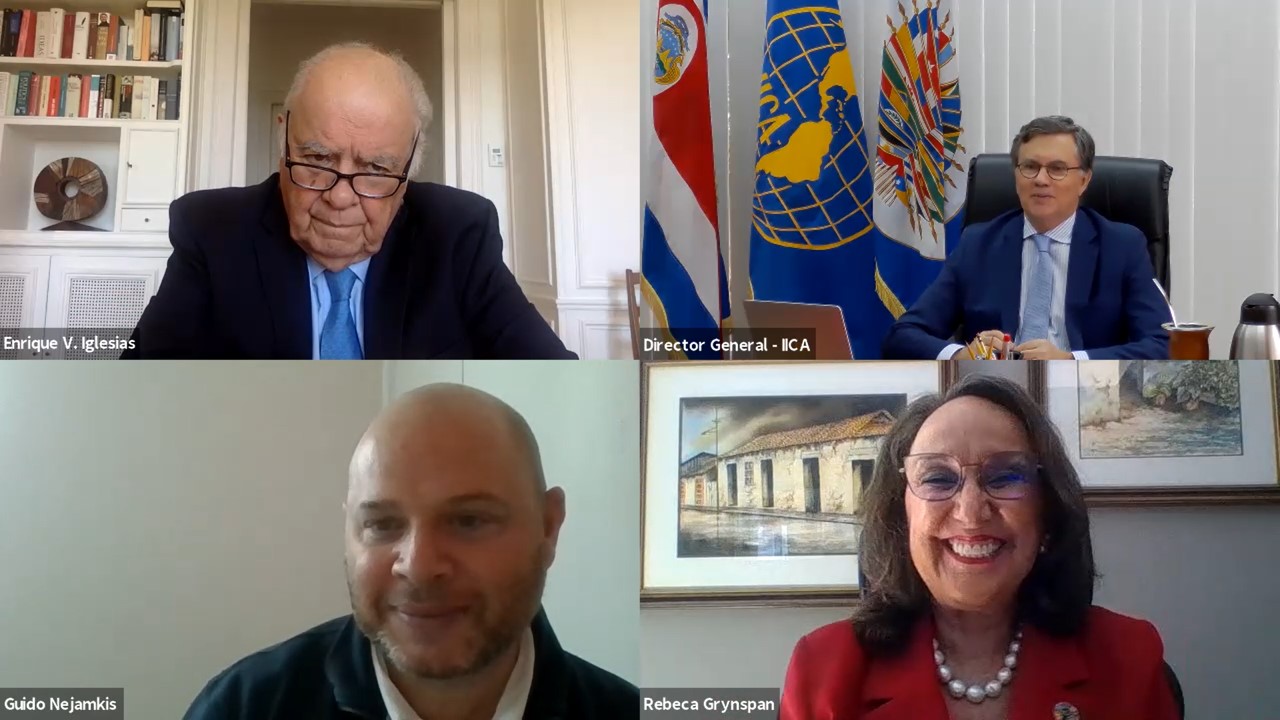Rebeca Grynspan, Ibero-American Secretary General, and her predecessor Enrique Iglesias, who previously served as president of the IDB, launched the series of webinars entitled “Reflections on the World and Food Security in LAC post COVID-19” organized by IICA.

San Jose, 13 May 2020 (IICA). The Inter-American Institute for Cooperation on Agriculture (IICA) has launched the series of virtual seminars entitled “Reflections on the World and Food Security in LAC post COVID-19.” The initiative seeks to identify potential solutions and anticipate the policies that will be required to contribute to food security, economic recovery and trade in the wake of the pandemic.
During the first webinar, Rebeca Grynspan, Ibero-American Secretary General, and Enrique Iglesias, former president of the Inter-American Development Bank (IDB) analyzed potential challenges in the aftermath of the health crisis, as well as its political and social effects.
Grynspan and Iglesias discussed some of the key elements for mitigating the effects of the pandemic, which they described as an “unprecedented” crisis, in Latin American countries. Among other things, they cited the development of a new multilateralism, greater regional integration and cooperation, strong political leadership, as well as solid support for micro-, small- and medium-sized enterprises (SMEs) as well as production units.
“This is a unique crisis that requires unique solutions. The concert of nations will engage in a discussion about the post-Covid-19 multilateral structure; Latin America could make very relevant contributions,” remarked Grynspan.
Iglesias underscored the need to avoid the prevalence of an “international community that does not know how to react to these challenges and in which there is tension between the world’s superpowers with respect to economic, commercial and political matters.”
“The adoption of multilateral rules that have been agreed upon by all countries is a fundamental pillar; this will allow for setting global dynamics in motion,” he added.
Manuel Otero, Director General of IICA, opened the series of seminars.
The participants agreed that, as a result of the crisis, there is greater appreciation for State-level actions. However, crucial and inevitable measures, such as confinement and social isolation, have exacerbated several issues, such as low productivity, poverty, unemployment, food insecurity and gender violence, while also expanding the digital gap.
“This year, production in countries of the central region is expected to fall between 10% and 15%, which is totally unheard of,” noted Iglesias.
“Projections are worrisome: 30 million more people are expected to fall below the poverty line this year, and 16 million of them will be living in extreme poverty. We are talking about a food and hunger crisis that will impact a significant portion of the Latin American population,” added Grynspan.
The Ibero-American Secretary General added that the upcoming phase of the Covid-19 crisis will shed light on losses, especially with respect to formal employment, as well as the economic and social impact of the pandemic. “Fifty percent of our population is currently engaged in informal employment; this will soon be the case for an estimated 12 million people in the region,” explained Grynspan.
Opportunities for agriculture
Iglesias and Grynspan stressed the fact that, for Latin America’s agriculture and food sector, the post-pandemic scenario affords a valuable opportunity for the region to further strengthen its standing as a major food supplier.
“The world to come will usher the need for food, and Latin America is one of the greatest suppliers. Through technology, we can accomplish a lot more than we have so far. It is crucial that we provide direct support to SMEs, especially those involved in small-scale farming. All of this will enable us to somehow manage the economic issues,” stated Iglesias, former president of the IDB.
The speakers considered that IICA will play an important role within this context, given the fact that food will be a crucial issue post Covid-19. They also highlighted the organization’s efforts to minimize the impact of the pandemic on the agriculture sector in the hemisphere.
“Latin America must learn to implement State policies for agriculture and rurality. Hopefully, the pandemic will provide an opportunity to give greater priority to the agriculture sector and to capitalize on the bioeconomy in order to expand the scope of agriculture, so that it includes more than just commodities. That is what we are working on. These are difficult times, and the greater the crisis, the more technical cooperation we will offer,” concluded Manuel Otero, Director General of IICA.
The next seminar in the series organized by IICA will take place on Thursday, 14 May at 4 p.m. (Costa Rica time). Participants will discuss sustainable development, agriculture and food within the new international context.
The seminars will be hosted in IICA’s new virtual conference room and will be disseminated on the Institute’s official social media accounts on Facebook, YouTube and Instagram.
Each of the presentations will be uploaded to IICA’s blog, where visitors can comment and engage in discussions: https://blog.iica.int/.
More information:
Federico Villarreal, Director of Technical Cooperation at IICA.
federico.villarreal@iica.int











